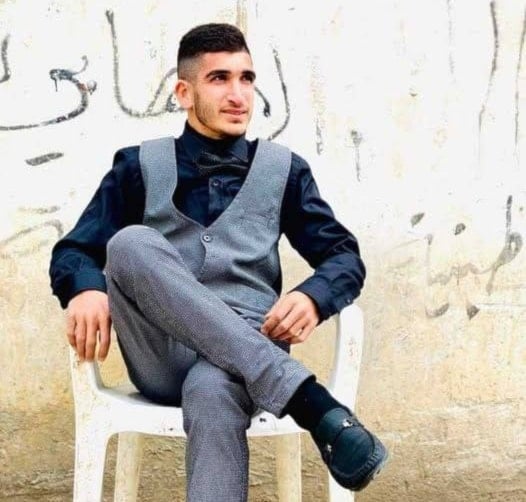20-year-old Palestinian detainee martyred in Israeli prison
A statement by the Commission of Detainees and Ex-Detainees Affairs and the PPS emphasized that this period is now the "bloodiest" in the history of the Captive Movement and the Palestinian people.
-

Martyred Palestinian detainee Musab Hassan Adili from Nablus (Social media)
Palestinian detainee Musab Hassan Adili (20 years old) from Nablus was martyred on Wednesday at the Israeli Soroka Medical Center, confirmed the Commission of Detainees and Ex-Detainees Affairs and the Palestinian Prisoners’ Society on the Palestinian Prisoners’ Day.
In a joint statement, the two bodies said Adili had been detained since March 22, 2024, and was serving a sentence of one year and one month.
His martyrdom adds to the growing list of martyrs from the Palestinian Captive Movement who have died as a result of the systematic crimes committed by the Israeli prison system, which has been operating in an unprecedented manner since the outset of the ongoing genocide in Gaza, the statement indicated.
The Commission and the PPS noted that with the martyrdom of Adili, the number of prisoners and detainees who have died since the beginning of the genocide has risen to 64, including at least 40 from Gaza.
The statement emphasized that this period is now the "bloodiest" in the history of the Captive Movement and the Palestinian people.
Accordingly, the total number of known prisoner martyrs since 1967 has reached 301, while the number of prisoners whose bodies are still withheld has risen to 73, including 62 since the start of the genocide, the two bodies highlighted.
More than 9,900 Palestinian prisoners are currently held in Israeli occupation prisons, among them are over 5,000 ill and injured as a result of systematic neglect and torture policies, the PPS said, adding that 520 Palestinian women were detained since October 7.
The martyrdom of detainee Adili on Palestinian Prisoners’ Day "constitutes yet another crime in the record of the Israeli apparatus of brutality, which has practiced all forms of crimes with the intent to kill prisoners, and these crimes represent yet another face of the ongoing genocide," the statement emphasized.
The Commission and the PPS asserted that the rising number of martyrdoms among prisoners and detainees will only become more dangerous with the passage of time, given the ongoing detention of thousands in Israeli prisons and their continuous exposure to systematic crimes, most notably torture, starvation, various forms of physical abuse, medical neglect, sexual violence, and the deliberate imposition of conditions that lead to serious and contagious diseases, particularly scabies (sarcoptic mange). This is in addition to unprecedented policies of deprivation and dispossession.
The two bodies held the Israeli occupation fully responsible for the death of detainee Adili and renewed their call to the international human rights system to move forward with effective decisions to hold Israeli leaders accountable for the war crimes they continue to commit against the Palestinian people.
They also called for the imposition of sanctions that would isolate "Israel" internationally, restore the core mission of the international human rights framework, end the "horrifying paralysis" it has experienced during the genocide, and bring an end to the "exceptional impunity" that has allowed "Israel" to remain above accountability, justice, and punishment.
Adili was transferred between al-Naqab and Megiddo prisons
The PPS noted that since the beginning of the genocide in Gaza, the al-Naqab and Megiddo prisons have emerged as the primary sites where prisoners and detainees have died, the latest being Adili.
Before his martyrdom and transfer to Soroka Medical Center, Adili was moved between the two prisons, spending most of his detention in Megiddo and later transferred to al-Naqab, the body said.
It reported that, according to testimonies, the level of abuse in al-Naqab and Megiddo prisons is escalating, especially in terms of torture, repression, starvation, and the unprecedented spread of diseases and epidemics, particularly scabies.
The statement pointed out that the al-Naqab and Megiddo are central prisons, housing thousands of detainees, and have witnessed the widest suppression campaigns since the genocide began.
It recalled that minor Walid Ahmad from Ramallah was martyred in Megiddo prison as a result of a "complex crime centered on starvation."
The PPS had earlier warned of a health disaster sweeping through both al-Naqab and Megiddo prisons due to the continued spread of diseases, especially scabies. It indicated that the Israeli prison system "has turned illness into a tool of torture by denying prisoners treatment and committing additional medical crimes against them."
The PPS warned that "unless the Israeli prison system halts its crimes, an even harsher and more dangerous phase lies ahead."
"Time has now become the most critical factor affecting the fate of the prisoners, as the ongoing, systematic crimes continue at the same intensity," it underscored, adding that "a prisoner who was once able to endure these abuses at the beginning of the genocide can no longer withstand them today."
Read more: Hamas calls for solidarity, liberation on eve of Prisoners' Day

 5 Min Read
5 Min Read










